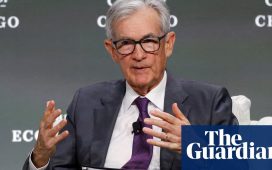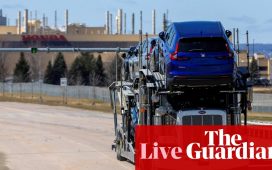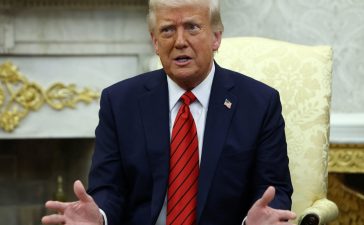Introduction: UK facing record low for living standards
Good morning, and welcome to our rolling coverage of business, the financial markets and the world economy.
The UK is facing a record low for living standards, analysis of yesterday’s budget shows, despite the pre-election tax cuts announced by chancellor Jeremy Hunt.
The Resolution Foundation has crunched the budget, and concluded that Hunt has “thrown fiscal caution to the wind” yesterday, leaving very little room (just £8.9bn) to hit his fiscal rule to have debt falling in five years.
Now it turns out that contrary to what some people were thinking this morning, the @OBR_UK actually CUT the amount of headroom the Chancellor had before this Budget. From 13bn to 12.2bn. The Chancellor “spent” £3.2bn of that, leaving him with £8.9bn. pic.twitter.com/9Sf3JxjbGO
— Ed Conway (@EdConwaySky) March 6, 2024
But while Hunt has made a net tax cut of £9bn, the UK’s cost of living crisis means real household disposable incomes (how much money households have after tax, adjusted for inflation) are set to fall between 2019 and 2025 – for the first parliament in modern history.
And looking further ahead, the tax take will be a 70-year high by 2028-29:
Torsten Bell, chief executive of the Resolution Foundation, warns that the budget maths is based on fictional cuts to public services after the election:
The £19 billion of cuts to unprotected public services after the next election are three-quarters the size of those delivered in the early 2010s. The idea that such cuts can be delivered in the face of already faltering public services is a fiscal fiction.
“Budgets are always a big day for Westminster, but the big picture for Britain has not changed at all. This remains a country where taxes are heading up not down, and one where incomes are stagnating.
“Big tax cuts may or may not affect the outcome of that election, but the task for whoever wins is huge. They will need to both wrestle with implausible spending cuts, and also restart sustained economic growth – the only route to end Britain’s stagnation.”
Yesterday, the Office for Budget Responsibility said Hunt’s plans meant funding for non-ringfenced government departments – including local government and prison services – was on track to fall by 2.3% per year.
Here are some of the key points from Resolution’s analysis (they’ll be discussing the budget at an event this morning).
-
Filling out the tax sandwich… Fresh reductions in National Insurance and Fuel Duty, coupled with previously announced tax threshold freezes, mean a net tax cut of £9 billion is taking effect in the election year. But this is dwarfed by the estimated £27 billion of tax rises that came into effect last year (2023-24) and the £19 billion that are coming in after the election (2025-27).
-
…by throwing fiscal caution to the wind. The Chancellor’s fiscal headroom against his fiscal rules is the second lowest on record, just a third of the average level seen since 2010. But this is not because his fiscal rules are strict – in fact, the plans in this Budget would violate three out of the four sets of such rules followed by Conservative Chancellors since 2010.
-
Britain’s £14,000 wage depression… Despite the Office for Budget Responsibility reducing its forecast for inflation, real average wages are only set to regain their 2008 levels in 2026, a staggering near-two lost decades of pay growth. Had pay instead continued along its pre-financial crisis path over this period, the average worker in 2023 would have been around £14,000 better off.
-
….and a record low for living standards. Across this Parliament (between 2019 and 2025), real household disposable income (RHDI) is set to fall by 0.9 per cent – the first parliament in modern history to see a fall in living standards.
The agenda
-
9am GMT: Resolution Foundation event: Assessing the Budget’s economic, and electoral, impact
-
10.30am GMT: Institute for Fiscal Studies presents its Budget analysis
-
12.30pm GMT: Challenger report on US job cuts
-
1.15pm GMT: European Central Bank interest rate decision
-
1.45pm GMT: European Central Bank press conference
Key events
New figures from the Office for National Statistis this morning shows another drop in job vacancies.
The total number of online job adverts on 1 March 2024 was 17% below the level seen in the equivalent period of 2023, data from Adzuna shows.
That continues “the downward trend since February 2022”, the ONS says, as demand for labour has cooled slightly.
Figures from @Adzuna show the total number of online job adverts on 1 March 2024 was 17% below the level seen in the equivalent period of 2023 💻
This continues the downward trend since February 2022. pic.twitter.com/YaN9cS9EmM
— Office for National Statistics (ONS) (@ONS) March 7, 2024
Activity on the high street appears to have picked up a little last week:
Here’s our news story on the IFS’s budget analysis:
IFS: Government and opposition are joining in a conspiracy of silence
The IFS’s Paul Johnson then accuses the government and the opposition of joining in “a conspiracy of silence” in not acknowledging the scale of the choices and trade-offs that will face the country after the election.
They, and we, could be in for a rude awakening when those choices become unavoidable, he fears.
On the politics of the budget, Johnson points out that the non dom changes and the extension of the energy profits levy announced by Jeremy Hunt were Labour policies.
In the “through-the-looking-glass” world of pre-election argy-bargy this will appear to make Labour’s job more difficult. They want to earmark the extra revenue from these taxes to fund some of their spending plans.
A moment’s thought should show this for the nonsense that it is, at least in the real world of fiscal constraints and trade-offs, if not in the rhetorical world of electoral politics.
First, the numbers involved are trivially small by comparison with the fiscal challenges. Three or four billion of revenues a year don’t even count as a drop in the fiscal ocean when it comes to the scale of the challenges facing us. And second, the fact that the changes have been announced doesn’t mean the revenue disappears. It’s still there, indeed more definitely so.
By accepting the NI cut, the opposition does make life more difficult for itself. That is £10 billion a year they have lost. The opposition have been just as shy as the chancellor about telling us what they actually intend to do on taxes and spending after the election.
If I am sceptical about Mr Hunt’s ability to stick to his current spending plans, I am at least that sceptical that Rachel Reeves will preside over deep cuts in public service spending.
IFS: UK faces eye wateringly tough choices to bring debt down
The IFS fear that the next parliament could well prove to be the most difficult of any in 80 years for a chancellor wanting to bring debt down.
Paul Johnson says:
Even stabilising debt as a fraction of national income is likely to mean some eye wateringly tough choices – and we are talking tens of billions of pounds worth of tough choices – on tax and spending.
Johnson points out that the goal of getting debt falling, as a share of GDP, just in five years time is based on a whole series of unlikely, or undesirable things.
Perhaps the unlikeliest is that the government will stop freezing fuel duty.
And the least desirable perhaps is that investment spending will fall by £18bn a year in real terms.
There’s also the prospect of £20bn of cuts to day-to-day spending on a range of public services outside of health, defence and education.
That, Johnson says, will require some staggeringly hard choices which the government has not been willing to lay out.
He says:
Indeed, we heard yesterday that the next spending review, in which these choices will have to be announced, will rather conveniently not happen until after the election.
One only has to look at the scale of NHS waiting lists, the number of local authorities at or near bankruptcy, the backlogs in the justice system, the long-term cuts to university funding, the struggles of the social care system, to wonder where these cuts will really, credibly come from.
You can watch the IFS’s presentation here:
IFS: People will be poorer at end of the parliament than the start
The Institute for Fiscal Studies’s analysis of the budget is just out.
And IFS director Paul Johnson says that nothing has changed very significantly following what Jeremy Hunt did yesterday, and what the OBR said.
That means we are:
-
heading for a parliament in which people will on average be worse off at the end than at the start,
-
looking at a debt to GDP ratio that is at its highest level in 70 years and is showing no signs of falling;
-
facing debt interest payments at close to all time highs;
-
seeing worrying increases in the number of individuals moving onto health and disability related benefits, bringing huge challenges for those households and rising costs for the public purse;
-
(despite the genuinely significant cuts in NICs) stuck with a situation where tax revenues will have risen by a record amount as a share of national income over this parliament and still heading towards UK record levels;
-
implicitly planning on big cuts in public investment spending overall and cuts to many areas of day-to-day spending on public services despite very obvious signs of strain in many areas.
📺 @PJTheEconomist opens our #Budget2024 event, warning that we:
– are still heading for a parliament in which people will on average be worse off at the end than at the start
– have the highest debt to GDP ratio in 70 years
– have debt interest payments close to all time highs.— Institute for Fiscal Studies (@TheIFS) March 7, 2024
Eyebrows were raised two years ago when high street stalwart Marks & Spencer announced it was appointing two CEOs to replace departing chief executive Steve Rowe.
And today, the arrangement is being put out to grass.
M&S has announced that co-chief executive Katie Bickerstaffe will retire from the retailer in July.
Bickerstaffe became co-CEO in 2022, alongside CEO Stuart Machin.
This unconventional structure meant she was in charge of driving M&S’s strategy of selling across multiple platforms, plus clothing & home, international and financial services, while Machin handled day-to-day leadership and M&S’s food business.
Today, M&S says that a “planned leadership evolution” will see Bickerstaff move on, and take up other board roles “in line with the original transition plan”.
Bickerstaffe says:
“I took on the Co-CEO role to support Stuart as he succeeded to Chief Executive Officer and because of my love for the brand and my determination to see the transformation of M&S through to the next stage. We have built a strong team, made great progress, and it is now right that the business and function heads report directly to Stuart.
I will leave with great memories and a strong sense of achievement.”
M&S’s shares are up 49% in the last year.
UK firms’ inflation expectations drop in February,
In happier news, British businesses’ expectations for inflation over the coming years have dropped.
A survey from the Bank of England has found that firms expect to curb their price rises over the next year,with output price inflation expected to decline by 1.1 percentage points over the next 12 months.
Companies also expect inflation to fall, but remain over the UK’s target. One-year ahead CPI inflation expectations have declined further to 3.3% in February, down from 3.4% in January.
Happily for workers (if not the Bank), firms expect to pay inflation-beating pay rises.
Expected year-ahead wage growth remained unchanged at 5.2% on a three-month-moving-average basis, the BoE says, while annual wage growth was 6.7% in the three months to February.
UK suffering slowest growth of any party’s period in office since the Second World War
Resolution Foundation also show the stark impact of the UK’s economic stagnation on living standards.
It will still take until 2026 for real wages to return to their 2008 level, their analysis shows – had real wages kept growing at their prefinancial crisis pace, the average worker in 2023 would have been around £14,000 better off
And, if the election is held at the end of this year, the period since 2010 will have seen GDP per capita grow by 0.8 per cent per year, and average wages by just 0.2 per cent per year in real terms.
On both measures, this would be the slowest growth of any party’s period in office since the Second World War:
The big, long-term picture is that by 2027-28, middle-earning workers will have done best out of the “personal tax rollercoaster” in this parliament, says Resolution Foundation.
It has calculated that workers earning between £26,000 and £60,000 will be “the net winners” by 2027-28, while lower and higher earning taxpayers will be worse off.
Overall, 55% employees will gain, they say – but that includes “significant variation”. Full time employees will on average gain £120, their part time colleagues lose £240.
In contrast, employers are paying more national insurance as the starting threshold for employer NI has been frozen.
And pensioners have also lost out; around 8 million pensioners are taxpayers, who lose from freezes to Income Tax thresholds but don’t benefit from NI changes.
Resolution’s analysis shows:
Compared to where the personal allowance might have been in 2027-28 without freezes, basic rate pensioners will be around £700 worse off and – taking into account also the higher-rate threshold freeze – the average taxpaying pensioner will lose around £1,000.
In total, policy will have increased taxes for pensioners by around £8 billion, a significant portion of the net personal tax rise.
But, as Resolution Foundation also point out, pensioners have also benefitted from the triple lock, and from higher savings rate in the last couple of years.
The economic forecasts that underpinned yesterday’s budget did not “play ball” for the chancellor, according to James Smith, research director at the Resolution Foundation.
The key news was the change in the OBR’s forecast for inflation – the fiscal watchdog has now “called time on high inflation”.
That weaker outlook for inflation (assuming the OBR are right) is clearly good news, but Smith also points out that it leads to lower tax receipts in future years. The OBR is also forecasting a slightly smaller economy in cash terms.
Resolution has calculated that the Chancellor has spent £65bn on tax cuts over the next five years, around a third of which has been funded by tax-raising policies.
So, with Hunt borrowing a further £10bn over the next five years, his fiscal buffers are alarmingly thin.
The £8.9bn of headroom to ensure debt is falling in that final year of the forecast is the second lowest on record, Smith explains:








